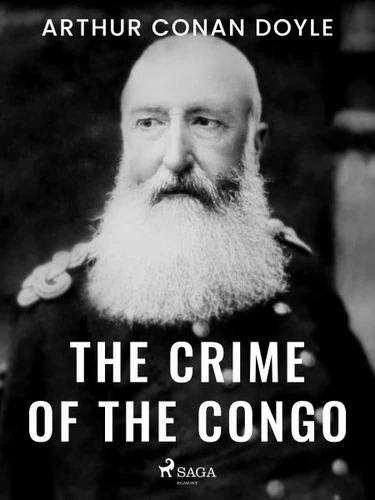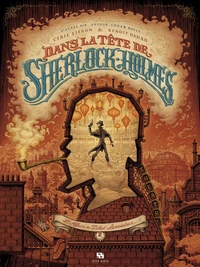Sir Arthur Conan Doyle, né le 22 mai 1859 et mort le 7 juillet 1930, débute sa vie professionnelle en tant que médecin. C'est pour pallier aux nombres restreintes de visites de son cabinet qu'il commence à écrire. C'est ainsi que, inspiré de son professeur d'université, le célèbre détective Sherlock Holmes est né. Véritable référence dans le genre de la littérature policière, ce personnage excentrique et intellectuellement supérieur se base sur sa mémoire et son formidable esprit d'analyse et de déduction pour résoudre ses passionnantes enquêtes. Sa popularité est telle que, lorsque Conan Doyle décide de le faire mourir pour se consacrer à ses romans historiques, il reçoit énormément de courriers de lecteurs le suppliant de continuer. En tout, le détective apparaît dans 56 nouvelles et 4 romans écrits par l'auteur mais aussi dans de nombreuses œuvres d'autres romanciers. Parmi les histoires les plus populaires, laissez-vous tenter par Les énigmes de Sherlock Holmes ou le très célèbre Le Chien des Baskerville. Après avoir dévoré tous les romans du célèbre limier, nous vous aidons à rassasier votre soif d'énigmes avec nos autres auteurs à succès. Agatha Christie et Le Crime de l'Orient-Express, Patricia Cornwell et son Vent de glace ou encore Remède mortel d'Harlan Coben... voici quelques titres particulièrement appréciés de notre communauté de lecteurs qui vous captivent jusqu'au bout de la nuit.
The Crime of the Congo
Par :Formats :
Disponible dans votre compte client Decitre ou Furet du Nord dès validation de votre commande. Le format ePub est :
- Compatible avec une lecture sur My Vivlio (smartphone, tablette, ordinateur)
- Compatible avec une lecture sur liseuses Vivlio
- Pour les liseuses autres que Vivlio, vous devez utiliser le logiciel Adobe Digital Edition. Non compatible avec la lecture sur les liseuses Kindle, Remarkable et Sony
 , qui est-ce ?
, qui est-ce ?Notre partenaire de plateforme de lecture numérique où vous retrouverez l'ensemble de vos ebooks gratuitement
Pour en savoir plus sur nos ebooks, consultez notre aide en ligne ici
- Nombre de pages132
- FormatePub
- ISBN978-87-28-01979-5
- EAN9788728019795
- Date de parution24/05/2022
- Protection num.Digital Watermarking
- Taille287 Ko
- Infos supplémentairesepub
- ÉditeurSAGA Egmont
Résumé
Best-known as the author of the Sherlock Holmes series of detective novels, in 'The Crime of the Congo' Sir Arthur Conan Doyle attempts to lay bare the atrocities which had taken place in the Congo under the rule of King Leopold II of Belgium. He describes the exploitation of the Congolese people, especially those involved in the rubber trade, as 'twenty years of uninterrupted massacre' and is dismissive of the eventual annexation by the Belgian government, viewing it as merely a cover-up and a continuation of the abuses.
A fascinating piece of work from the prolific author about a horrifying era, which effects are still being felt today. Sir Arthur Conan Doyle (1859-1930) was a British author, best known as the creator of the world-famous detective Sherlock Holmes. Born in Edinburgh, he was educated in England and Austria before studying medicine at the University of Edinburgh. It was during his time at university that Doyle began writing short stories, submitting them to magazines and journals.
His first Sherlock Holmes novel, 'A Study in Scarlet' was written in just three weeks and published in 1887 to favourable reviews, and more Sherlock adventures followed. By 1893, Doyle was growing tired of Sherlock and attempted to kill him off in the story 'The Final Problem', but public outcry caused him to resurrect the famous detective. He featured in a total of 56 short stories and four novels along with his trusty sidekick Dr Watson and made Doyle one of the best-paid authors of the time.
The stories have been adapted multiple times; most recently in the successful BBC series 'Sherlock' starring Benedict Cumberbatch and Martin Freeman. Later literary works included the Professor Challenger series which began with 'The Lost World', in which Challenger sets out to find evidence of prehistoric life. The book inspired numerous adaptations, including the films 'Jurassic Park' and 'The Lost World'.
In later life Doyle became captivated by the world of spiritualism and the occult and published non-fiction works about his beliefs including 'The Coming of the Fairies'. Arthur Conan Doyle died at home in 1930.
A fascinating piece of work from the prolific author about a horrifying era, which effects are still being felt today. Sir Arthur Conan Doyle (1859-1930) was a British author, best known as the creator of the world-famous detective Sherlock Holmes. Born in Edinburgh, he was educated in England and Austria before studying medicine at the University of Edinburgh. It was during his time at university that Doyle began writing short stories, submitting them to magazines and journals.
His first Sherlock Holmes novel, 'A Study in Scarlet' was written in just three weeks and published in 1887 to favourable reviews, and more Sherlock adventures followed. By 1893, Doyle was growing tired of Sherlock and attempted to kill him off in the story 'The Final Problem', but public outcry caused him to resurrect the famous detective. He featured in a total of 56 short stories and four novels along with his trusty sidekick Dr Watson and made Doyle one of the best-paid authors of the time.
The stories have been adapted multiple times; most recently in the successful BBC series 'Sherlock' starring Benedict Cumberbatch and Martin Freeman. Later literary works included the Professor Challenger series which began with 'The Lost World', in which Challenger sets out to find evidence of prehistoric life. The book inspired numerous adaptations, including the films 'Jurassic Park' and 'The Lost World'.
In later life Doyle became captivated by the world of spiritualism and the occult and published non-fiction works about his beliefs including 'The Coming of the Fairies'. Arthur Conan Doyle died at home in 1930.
Best-known as the author of the Sherlock Holmes series of detective novels, in 'The Crime of the Congo' Sir Arthur Conan Doyle attempts to lay bare the atrocities which had taken place in the Congo under the rule of King Leopold II of Belgium. He describes the exploitation of the Congolese people, especially those involved in the rubber trade, as 'twenty years of uninterrupted massacre' and is dismissive of the eventual annexation by the Belgian government, viewing it as merely a cover-up and a continuation of the abuses.
A fascinating piece of work from the prolific author about a horrifying era, which effects are still being felt today. Sir Arthur Conan Doyle (1859-1930) was a British author, best known as the creator of the world-famous detective Sherlock Holmes. Born in Edinburgh, he was educated in England and Austria before studying medicine at the University of Edinburgh. It was during his time at university that Doyle began writing short stories, submitting them to magazines and journals.
His first Sherlock Holmes novel, 'A Study in Scarlet' was written in just three weeks and published in 1887 to favourable reviews, and more Sherlock adventures followed. By 1893, Doyle was growing tired of Sherlock and attempted to kill him off in the story 'The Final Problem', but public outcry caused him to resurrect the famous detective. He featured in a total of 56 short stories and four novels along with his trusty sidekick Dr Watson and made Doyle one of the best-paid authors of the time.
The stories have been adapted multiple times; most recently in the successful BBC series 'Sherlock' starring Benedict Cumberbatch and Martin Freeman. Later literary works included the Professor Challenger series which began with 'The Lost World', in which Challenger sets out to find evidence of prehistoric life. The book inspired numerous adaptations, including the films 'Jurassic Park' and 'The Lost World'.
In later life Doyle became captivated by the world of spiritualism and the occult and published non-fiction works about his beliefs including 'The Coming of the Fairies'. Arthur Conan Doyle died at home in 1930.
A fascinating piece of work from the prolific author about a horrifying era, which effects are still being felt today. Sir Arthur Conan Doyle (1859-1930) was a British author, best known as the creator of the world-famous detective Sherlock Holmes. Born in Edinburgh, he was educated in England and Austria before studying medicine at the University of Edinburgh. It was during his time at university that Doyle began writing short stories, submitting them to magazines and journals.
His first Sherlock Holmes novel, 'A Study in Scarlet' was written in just three weeks and published in 1887 to favourable reviews, and more Sherlock adventures followed. By 1893, Doyle was growing tired of Sherlock and attempted to kill him off in the story 'The Final Problem', but public outcry caused him to resurrect the famous detective. He featured in a total of 56 short stories and four novels along with his trusty sidekick Dr Watson and made Doyle one of the best-paid authors of the time.
The stories have been adapted multiple times; most recently in the successful BBC series 'Sherlock' starring Benedict Cumberbatch and Martin Freeman. Later literary works included the Professor Challenger series which began with 'The Lost World', in which Challenger sets out to find evidence of prehistoric life. The book inspired numerous adaptations, including the films 'Jurassic Park' and 'The Lost World'.
In later life Doyle became captivated by the world of spiritualism and the occult and published non-fiction works about his beliefs including 'The Coming of the Fairies'. Arthur Conan Doyle died at home in 1930.



















